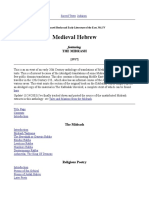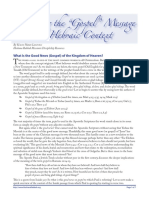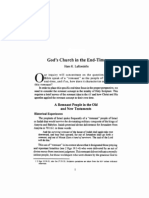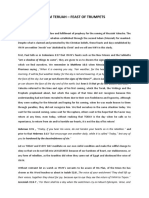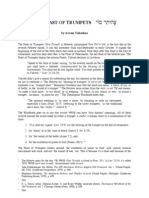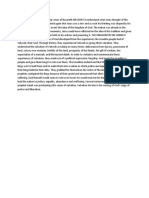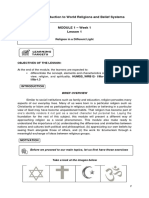Captura de Pantalla 2024-09-27 A La(s) 11.51.12 A.M.
Captura de Pantalla 2024-09-27 A La(s) 11.51.12 A.M.
Uploaded by
jh4msv2zxqCopyright:
Available Formats
Captura de Pantalla 2024-09-27 A La(s) 11.51.12 A.M.
Captura de Pantalla 2024-09-27 A La(s) 11.51.12 A.M.
Uploaded by
jh4msv2zxqOriginal Title
Copyright
Available Formats
Share this document
Did you find this document useful?
Is this content inappropriate?
Copyright:
Available Formats
Captura de Pantalla 2024-09-27 A La(s) 11.51.12 A.M.
Captura de Pantalla 2024-09-27 A La(s) 11.51.12 A.M.
Uploaded by
jh4msv2zxqCopyright:
Available Formats
Welcome to Nitzavim-Vayelech (You are Standing /
And He Went), this week’s Parsha (Torah portion).
Shabbat Shalom Martin!
Due to there being more Torah portions than weeks this
year, the Parsha (portion) for this Shabbat (Sabbath)
combines two Torah studies: Nitzavim (You are
Standing) and Vayelech (And He Went).
Please read along with us as we study this portion.
NITZAVIM (You are Standing) / Vayelech (And He
Went)
Deuteronomy 29:9(10)–31:30, Isaiah 61:10–63:9,
Luke 24:1–12/Luke 24:13–43
“You are standing [nitzavim] today in the presence of
the Lord your God…. You are standing here in order to
enter into a covenant with the Lord your God.”
(Deuteronomy 29:10, 12)
Lifting the Torah in Jerusalem
Last week, in Parsha Ki Tavo (When You Enter), God
instructed the Israelites to bring the first-ripened fruits
(bikkurim) to the Temple in Jerusalem once they have
finally entered the Land He promised to them.
This week, in Nitzavim-Vayelech, the Jewish People
stand before God about to enter into the covenant, a
solemn oath with Him.
The Parsha opens with a declaration of the unity of
Israel.
Why were the Israelites collectively standing before
God? It was for one reason alone: to enter into a
covenant with Him.
The expression you are standing (atem nitzavim) is
used almost 300 times in the Bible and always to
enter into some kind of contract, pact or
agreement.
All were invited to enter into the brit (covenant) with
Adonai—from the least to the greatest. Everyone, from
the leaders, elders and officers of tribes, to their wives
and children had equal opportunity to receive a place in
the Kingdom of God.
Even the ger (stranger or foreigner) was offered an
equal place in the covenant with Elohim, in order “that
He may establish you today as a people for Himself, and
that He may be God (Elohim) to you.” (Deuteronomy
29:13)
A Jewish man prays at the Western (Wailing) Wall in Jerusalem.
This Shabbat Bless Israel and Yeshua, Click Now
This covenant was unique in that it transcended
any limitation of time or place. It was made with
“those standing there as well as with those who were
not present at that time.” (Deuteronomy 29:15)
After Israel broke this covenant, God promised through
the Hebrew prophet Jeremiah a “New Covenant” (Brit
Chadashah) for the people of Israel and Judah:
“‘The days are coming,’ declares the LORD, ‘when I
will make a new covenant (Brit Chadashah) with the
people of Israel and with the people of Judah. It will
not be like the covenant I made with their ancestors
when I took them by the hand to lead them out of
Egypt, because they broke My covenant, though I
was a husband to them,’ declares the LORD.”
(Jeremiah 31:31–32)
Once again, this covenant is extended to everyone—
from the least to the greatest:
“No longer will they teach their neighbor, or say to one
another, ‘Know the LORD,’ because they will all know
Me, from the least of them to the greatest, declares the
LORD.” (Jeremiah 31:34)
So, if this New Covenant has been promised to the
House of Israel and the house of Judah, how do the
Gentile followers of Yeshua the Messiah enter into
God’s Kingdom?
We are told in the book of Ephesians that it is
through the blood of Yeshua that those who were far
away have been brought near and granted an equal
place in the covenants of promise.
“Therefore, remember that formerly you who are
Gentiles by birth and called ‘uncircumcised’ by
those who call themselves ‘the circumcision’ (which
is done in the body by human hands)—remember
that at that time you were separate from Messiah,
excluded from citizenship in Israel and foreigners to
the covenants of the promise, without hope and
without God in the world. But now in Messiah
Yeshua you who once were far away have been
brought near by the blood of Messiah.”
(Ephesians 2:11–13)
An Orthodox Jewish man and a tourist stand side by side at the Western
(Wailing) Wall praying fervently.
The Hebrew Scriptures from Parsha Nitzavim-Vayelech
are always recited on the Sabbath preceding the
evening Selichot (prayers for forgiveness) service,
which takes place on Motzei Shabbat, the night after
the Sabbath ends; that is, after nightfall on Saturday
(around midnight).
These special tefillah (prayers) are recited before the
normal shacharit service (morning prayer) from the
Sunday before Rosh Hashanah (Jewish New Year)
until Yom Kippur (Day of Atonement). They add an
extra 45 minutes of prayer.
Thus, the mood of repentance becomes more urgent as
the month of Elul draws to a close, as we prepare for a
special period called the Yamin Noraim or the Ten
Days of Awe, a time designated for repentance between
Rosh Hashanah and Yom Kippur.
In English, this period is often referred to as the High
Holy Days. It is a time for deep introspection,
reflection, and an honest examination of one’s
spiritual state.
A Jewish rabbi recites selichot.
In this Parsha, Moses asks the people to examine
themselves.
He warns them, in a dire prediction, that because of
their obstinacy, idolatry and sin, they would be forced to
endure a nightmare of tragedies including siege, famine,
poverty, war, forced exile, and desolation: however,
Israel would survive as a nation and would return to
the Holy Land.
This prophecy was fulfilled in May 1948 with the
re-birth of the state of Israel.
This re-birth of an independent Jewish state stands in
contrast to so many great empires which have come
and gone.
God has faithfully kept His covenant with Israel.
A Jewish boy holds the flag of the State of Israel.
We are very grateful for all sponsorships.
sponsor Evangelism & Bible Translation
sponsor a Bible Chapter or Prophecy
The Haftarah (Prophetic Portion)
"Comfort, comfort My people, says your God." (Isaiah
40:1)
For the past seven weeks since Tisha B’av—the
remembrance of the destruction of Jerusalem and the
Holy Temples—all the prophetic messages in the
Haftarot have focused on comfort and consolation.
The Hebrew prophet, Isaiah, comforts the exiles of
Israel with the assurance that God has forgiven their
sins and, in His mercy, will bring them back to their
Land. Haftarah Nitzavim is the climax of these
seven messages of comfort.
The prophetic portion of Scripture studied this Shabbat
passes over the first portion of Isaiah 61, which is an
important Messianic prophecy. Whether or not this
is a deliberate omission to keep the knowledge of
Yeshua from the common people is debatable.
However, it is important that we read and study the
entire Bible and not rely only upon the traditional
Haftarah portions that may leave out these crucial
Messianic prophecies.
This omitted prophecy of Isaiah 61 is the passage that
Yeshua read in the synagogue on the Sabbath
(Shabbat) to proclaim Himself Messiah, as well as
proclaim “The Year of the LORD’s Favor.” (Luke 4:16–
19)
“... The Spirit of the Sovereign LORD is on Me,
because the LORD has anointed Me to proclaim
good news to the poor. He has sent Me to bind up
the brokenhearted, to proclaim freedom for the
captives and release from darkness for the
prisoners to proclaim the year of the LORD’s favor.”
(Isaiah 61:1–2)
Yeshua Unrolls the Scroll in the Synagogue,
by James Tissot
The rest of the verse, which Yeshua apparently did not
read, is for future fulfillment: “… and the day of
vengeance of our God” looks forward to the day of
Yeshua's return, when He will take vengeance on
the enemies of Israel.
In this Haftarah portion, God appears dressed as a
warrior in that day of vengeance; His clothes stained in
the blood of Israel’s enemies.
“Who is this coming from Edom [descendants of
Esau—terrorist faction of radical Islam], from
Bozrah, with His garments stained crimson? Who is
this, robed in splendor, striding forward in the
greatness of His strength? ‘It is I, proclaiming
victory, mighty to save.’” (Isaiah 63:1)
Israel stands as a sign and beacon to all peoples
everywhere of the wonderful grace and mercy of God.
Its glorious restoration reveals that God can replant,
rebuild, re-establish His people from the worst
destruction in each one of our lives. If we will give Him
our ashes and mourning, He will give us beauty and the
oil of joy.
“The Lord has anointed Me to ... provide for those
who grieve in Zion— to bestow on them a crown of
beauty instead of ashes, the oil of joy instead of
mourning, and a garment of praise instead of a
spirit of despair.” (Isaiah 61:1, 3)
"They will enter Zion with singing; everlasting joy will crown their heads.
Gladness and joy will overtake them, and sorrow and sighing will flee away."
(Isaiah 51:11)
New Beginnings in the Haftarah
This week's Haftarah (prophetic portion) provides three
powerful images of new beginnings:
1. New Clothes:
“For God has clothed me in garments of triumph,
wrapped me in a robe of victory, like a bridegroom
adorned with a turban, like a bride bedecked in her
finery.” (Isaiah 61:10)
God is going to give us a whole new look, and whether
we are male or female, we’re going to look gorgeous!
He will be giving us a new beautiful wardrobe, fixing up
our hair, placing the necklace of precious jewels around
our neck, fussing with our appearance to make us look
our best, a perfect Bride without spot or wrinkle.
This is the ultimate makeover.
God’s Bride, Israel and the foreigners who all abide
in Yeshua HaMashiach (Jesus the Messiah), is being
prepared to meet her Beloved. Instead of defeat and
despair, we are going to be clothed in triumph and
victory!
A bride and groom
Please help our Bible Prophecy Project, click here
2. A New Name (Identity):
In the Bible, a name change is a sign of a major life
change or transformation.
God changed Abram and Sarai's names to Abraham
and Sarah by adding the Hebrew letter hey ()ה. This
Hebrew letter occurs in two out of the four letters of
God’s name YHVH. With a part of God’s identity
meshed into their own, they were able to be fertile and
fulfill their God-given destiny.
Jacob’s name was also changed from Yaacov (which
can mean heel, but also deceiver) into Yisrael—
triumphant with God. Or it may be derived from the
verb yashar, meaning straight / honest with God.
Likewise, the Bible promises that God will give
Israel a new name.
“You will be called by a new name... No longer will
you be called Forsaken [Azuva], neither shall your
land any more be called Desolate [Sh’mamah]; but
you shall be called, ‘My delight is in her [Heftzi-
bah] and your land, Married [Be’ulah]; for the Lord
delights in you and your land shall be married.”
(Isaiah 62:2, 4)
In Revelation 2, a chapter emphasizing repentance, God
once again promises a new name:
"To the one who is victorious, I will give some of the
hidden manna. I will also give that person a white
stone with a new name written on it, known only to
the one who receives it." (Revelation 2:17)
God wants to change our name so we can know our
true identity in the Messiah: righteous, holy, redeemed,
forgiven, free, friend of God.
Once we truly know who we are in Him, we will begin to
act differently, like true children of God. Others will see
us and relate to us differently, and our whole lives will be
transformed.
“As a man thinks in his heart, so is he.” (Proverbs 23:7)
A Jewish woman prays at the Wailing Wall in Jerusalem.
3. New Love and Intimacy
The third image is that of new love and intimacy.
The Hebrew root word Baal, which occurs several times
in Isaiah 62:4–5, means marry. God loves Israel and He
loves us as a bridegroom loves His bride.
We are the beautiful Bride of the Messiah, a “crown of
beauty in the hand of the Lord—a royal diadem
[precious gem]"—and He rejoices over us: “As the
bridegroom rejoices over the bride, so shall your God
rejoice over you.” (Isaiah 62:3, 5)
God is so intimate with us that He Himself dresses us
with new garments, like a mother with a little child; He
names us with a new name, as the parent of a new
baby; and He rejoices over us, as a bridegroom who
loves His bride.
A bride and groom in Israel (Photo: Go Israel)
On our journey of transformation, as we at times go
through the fires and floods of affliction, we can find
comfort in the knowledge that God is with us and He
cares for us. He will never leave us nor forsake us. He is
so intimately involved with us that in all of our affliction,
He is afflicted.
Perhaps this is one of the reasons that Isaiah states that
Messiah is a “man of sorrows and well acquainted with
grief.” (Isaiah 53:3)
One of the names of God is YHVH Shamah, which
means God is There. Sometimes that’s all we need—to
know that He is “there for us.” He is God with us—
Emanu-El.
Yes, God wants to restore, rebuild, renew, and even
avenge, but as we reflect on this past year, if we see
pain and anguish, let us remember that God can do
much more than just meet our needs: He is the
parent who dresses and provides for us, the counselor
who guides us into all we can be, and the lover who
adores us.
This may not take away the hurt. God doesn’t always
instantly fix every broken thing in our lives, but He is
always there for us to provide, comfort, and encourage.
Perhaps this is all we need to find the courage to begin
again—to walk into the new thing that God has
prepared for His Beloved.
In these troubled, difficult last days, please pray for the
salvation of the Jewish People and help us bring the
Good News of Yeshua to the Holy Land.
"You will again have compassion on us; You will tread
our sins underfoot and hurl all our iniquities into the
depths of the sea." (Micah 7:19)
Please help us proclaim Yeshua to Israel and the nations with your
gift of $100, $50, $250, $500 or $1000
YES, I want to Give a Special Shabbat Gift Today
sponsor Evangelism & Bible Translation
sponsor a Bible Chapter or Prophecy
Give your Shabbat Tithe
"Hear the word of the LORD, you nations; proclaim it in
distant coastlands: 'He who scattered Israel will gather
them and will watch over His flock like a shepherd."
(Jeremiah 31:10)
Shabbat Shalom from the Entire Bibles For Israel Family!
“‘Bring the whole tithe into the storehouse, that there
may be food in My house. Test Me in this,' says the
Lord Almighty, 'and see if I will not throw open the
floodgates of heaven and pour out so much blessing
that there will not be room enough to store it.’” (Malachi
3:10)
**************** DO NOT REPLY TO THIS EMAIL *****************
To Unsubscribe, please scroll down to the unsubscribe link.
For Help with Making a DONATION, Please go to our Contact Page.
Financial Partners, please CLICK on the following link: http://free.messianicbible.com/
contact/
(If the link does not work, please copy and paste it in your browser.)
Financial Partners, we value your support and we will respond to you as quickly as
possible.
Copyright © 2024 MessianicBible.com
Articles cannot be copied without permission
Unsubscribe
This message was sent to martinsant@me.com from news@biblesforisrael.com
Messianic Bible
Bibles For Israel
P.O. Box 8900
Pueblo, CO 81008
You might also like
- Messianic SiddurDocument76 pagesMessianic SiddurMedad Aharon83% (12)
- Numbers 18Document8 pagesNumbers 18Xt3rmin8rNo ratings yet
- Naso ETZ HAYIMDocument27 pagesNaso ETZ HAYIMMarco MV100% (1)
- The Biblical FeastsDocument16 pagesThe Biblical FeastsPulp Ark100% (2)
- Awake, Bride: We Are in The Great TribulationDocument352 pagesAwake, Bride: We Are in The Great TribulationeengelbriteNo ratings yet
- Isaiah As A Miniature BibleDocument6 pagesIsaiah As A Miniature Bibletemerloglou100% (1)
- Love Thy Palestinian Neighbor - A Bar Mitzvah Dvar Torah by Elijah David GoldDocument5 pagesLove Thy Palestinian Neighbor - A Bar Mitzvah Dvar Torah by Elijah David Goldapi-259139170No ratings yet
- Medieval Hebrew - The Midrash RabbaDocument150 pagesMedieval Hebrew - The Midrash Rabbajustordinary100% (1)
- Mishnah: Jump To Navigationjump To SearchDocument4 pagesMishnah: Jump To Navigationjump To SearchgitanoNo ratings yet
- 1993 Issue 10 - Sermon On Luke 2:25-35 - The Nunc Dimittis - Counsel of ChalcedonDocument6 pages1993 Issue 10 - Sermon On Luke 2:25-35 - The Nunc Dimittis - Counsel of ChalcedonChalcedon Presbyterian ChurchNo ratings yet
- Esurrection o Eshu : From A Hebrew Roots PerspectiveDocument23 pagesEsurrection o Eshu : From A Hebrew Roots PerspectiveAdim AresNo ratings yet
- A Pastor Asks Mormons Why Do I Need The BOM If I Have The HB To Testify About JesusDocument4 pagesA Pastor Asks Mormons Why Do I Need The BOM If I Have The HB To Testify About JesusRonnie Bennett Aubrey-BrayNo ratings yet
- Yeshurun International - Publication No.20: Messiah Ben DavidDocument3 pagesYeshurun International - Publication No.20: Messiah Ben DavidJon BobNo ratings yet
- Yada Yahweh Called-Out Assemblies YowbelDocument8 pagesYada Yahweh Called-Out Assemblies YowbelAbraham NiyongereNo ratings yet
- 33 Parasha B'chukkotaiDocument8 pages33 Parasha B'chukkotairahwayNo ratings yet
- 2012 Fall TSJ s06 The Release of Justice PT 2 - Stuart GreavesDocument7 pages2012 Fall TSJ s06 The Release of Justice PT 2 - Stuart Greavesapi-164301844No ratings yet
- The Gospel According To IsaiahDocument4 pagesThe Gospel According To IsaiahKingdom Teachings Shared By Apostle John EckhardtNo ratings yet
- The Greater Exodus Not The RaptureDocument6 pagesThe Greater Exodus Not The RaptureBlackShadowSnoopy100% (1)
- A Savior For Turbulent TimesDocument11 pagesA Savior For Turbulent TimesTomas Pua Sr IS-SecondaryNo ratings yet
- Fred Briones IsaiahDocument9 pagesFred Briones Isaiahjohnpaultiman7No ratings yet
- Mercy Fulfilled in The Gospel of LukeDocument7 pagesMercy Fulfilled in The Gospel of LukeTami JelinekNo ratings yet
- Comfort My PeopleDocument13 pagesComfort My Peopledeedee.restoNo ratings yet
- Title Heard The Voice of The LordDocument1 pageTitle Heard The Voice of The Lordjohnpaultiman7No ratings yet
- The Biblical Sabbath and The CalendarDocument197 pagesThe Biblical Sabbath and The CalendarCheryl Scrate100% (1)
- Ezekiel’s Temple, the Messianic Kingdom, and Daniel 9: ‘Video Tour’ of Ezekiel 40-48From EverandEzekiel’s Temple, the Messianic Kingdom, and Daniel 9: ‘Video Tour’ of Ezekiel 40-48No ratings yet
- Tenth New Moon 2012Document24 pagesTenth New Moon 2012SarahNeshNo ratings yet
- The StoneDocument15 pagesThe StonetylermabgweNo ratings yet
- Apostle DR Opoku OnyinahDocument7 pagesApostle DR Opoku OnyinahDavia Naana EffsonNo ratings yet
- Jesus and The Dead Sea ScrollsDocument183 pagesJesus and The Dead Sea ScrollstassoshNo ratings yet
- GospelDocument7 pagesGospelAdim AresNo ratings yet
- 19 Sunday in Ordinary Time - Cycle BDocument6 pages19 Sunday in Ordinary Time - Cycle Balex geronaNo ratings yet
- Jacob's Time of Trouble-2Document30 pagesJacob's Time of Trouble-2Michael MasaitiNo ratings yet
- Bibleinfo What Does Christ MeanDocument5 pagesBibleinfo What Does Christ MeanPishoi ArmaniosNo ratings yet
- The BibleDocument8 pagesThe BibleDasoNo ratings yet
- LaRondelle God's ChurchDocument25 pagesLaRondelle God's ChurchIgnacio de la Cruz100% (2)
- Seder-Participant-Haggadah - PDF FROM REMNANT RADIO PDFDocument28 pagesSeder-Participant-Haggadah - PDF FROM REMNANT RADIO PDFShalom Girl100% (1)
- Is There A Heavenly MotherDocument9 pagesIs There A Heavenly MotherYasi ArcadeNo ratings yet
- Tuning in the Good Shepherd - Volume 2: Daily Meditations from Isaiah to RevelationFrom EverandTuning in the Good Shepherd - Volume 2: Daily Meditations from Isaiah to RevelationNo ratings yet
- Feast of Trumpets - Yom Teruah - Ziua StrigatelorDocument18 pagesFeast of Trumpets - Yom Teruah - Ziua StrigatelorRafaela LazareanuNo ratings yet
- The Feast of Trumpets: by Avram YehoshuaDocument35 pagesThe Feast of Trumpets: by Avram Yehoshuarobel2012No ratings yet
- The Gathering: by Charles MeekDocument4 pagesThe Gathering: by Charles MeekKingLNo ratings yet
- The Heart of Christmas: A Devotional for the SeasonFrom EverandThe Heart of Christmas: A Devotional for the SeasonRating: 3 out of 5 stars3/5 (1)
- The Isaiah 62 Global 21 Days of Prayer and Fasting For Israel May 7 28 2023 1Document2 pagesThe Isaiah 62 Global 21 Days of Prayer and Fasting For Israel May 7 28 2023 1Robert J AgustinNo ratings yet
- Set 4 - A Ten Day Guide For The Days of Awe Sept 21 - 30, 2017Document21 pagesSet 4 - A Ten Day Guide For The Days of Awe Sept 21 - 30, 2017hungryniceties100% (1)
- Blotting Out The Name of JesusDocument34 pagesBlotting Out The Name of JesusPat Ruth Holliday100% (1)
- 11OT3C Book of IsaiahDocument23 pages11OT3C Book of IsaiahMenreet GergesNo ratings yet
- Motivated by Hope: Lesson 7 For May 18, 2024Document13 pagesMotivated by Hope: Lesson 7 For May 18, 2024TsuuNo ratings yet
- Gabriel Is Not The Holy SpiritDocument35 pagesGabriel Is Not The Holy SpiritMichel Alhassan YahayaNo ratings yet
- Sukkot Handout The Holidays of God 102008Document5 pagesSukkot Handout The Holidays of God 102008ZebedeiNo ratings yet
- Revelation FaithDocument7 pagesRevelation FaithThorxus LeivnggerNo ratings yet
- Theo SauceDocument10 pagesTheo Saucewhogives ashitNo ratings yet
- The MessiahDocument8 pagesThe Messiahapi-3711938No ratings yet
- 7 Biblical Answers Israel and The Church 2019Document4 pages7 Biblical Answers Israel and The Church 2019Onyebuchi Obed chukwubuikemNo ratings yet
- The Only Hope in The Coming StormDocument8 pagesThe Only Hope in The Coming Stormsupermario111No ratings yet
- Lesson 1: Adam: Wisdom of Understanding Values: Understanding Bible Story: Genesis 2:8-25 AdamDocument3 pagesLesson 1: Adam: Wisdom of Understanding Values: Understanding Bible Story: Genesis 2:8-25 AdamAngel AmpolitodNo ratings yet
- Climbing Up The Ladder of TefillahDocument45 pagesClimbing Up The Ladder of TefillahYehoishophotOliverNo ratings yet
- Genesis+Study+Worksheets +11+Lessons+in+1+DocumentDocument87 pagesGenesis+Study+Worksheets +11+Lessons+in+1+DocumentGinny Conner MoodyNo ratings yet
- Theo MidtermDocument9 pagesTheo MidtermAira Lorraine LilaganNo ratings yet
- The Matzah of LotDocument10 pagesThe Matzah of LotAri KahnNo ratings yet
- Are You Faithful in All Things?Document23 pagesAre You Faithful in All Things?Ezekiel AdeniranNo ratings yet
- Journey To The Promised LandDocument2 pagesJourney To The Promised LandSunny Stringham ThomasNo ratings yet
- LDS Old Testament Handout 08: Abraham's GenealogyDocument2 pagesLDS Old Testament Handout 08: Abraham's GenealogyMike Parker100% (1)
- (Pheme Perkins) Jesus As Teacher (Understanding Je (BookFi)Document124 pages(Pheme Perkins) Jesus As Teacher (Understanding Je (BookFi)rowan chibi100% (1)
- When God Is NearDocument17 pagesWhen God Is NearKorenPub100% (1)
- When God SpeaksDocument26 pagesWhen God SpeaksJoven CampuganNo ratings yet
- Daf Ditty Succah 53: Sealing The Abyss/ChaosDocument59 pagesDaf Ditty Succah 53: Sealing The Abyss/ChaosJulian Ungar-SargonNo ratings yet
- Lesson - 70 - Ehud - The - Judge WorksheetsDocument8 pagesLesson - 70 - Ehud - The - Judge WorksheetsRichelle MendozaNo ratings yet
- Joshua 2 Summary and Chapter OutlineDocument2 pagesJoshua 2 Summary and Chapter OutlineNice SoejimaNo ratings yet
- Work-Melakhah Part 1Document10 pagesWork-Melakhah Part 1lulun1990No ratings yet
- Bible KJV Wide-MarginDocument973 pagesBible KJV Wide-Marginstagmo100% (1)
- Simon J. Gathercole - Review of 'Justification and Variegated Nomism'Document10 pagesSimon J. Gathercole - Review of 'Justification and Variegated Nomism'buster301168100% (1)
- Daniel C Juster Jewish Roots Understanding Your Jewish Faith DestinyDocument380 pagesDaniel C Juster Jewish Roots Understanding Your Jewish Faith DestinyRev. Johana VangchhiaNo ratings yet
- The Sword of Moses Harba de Moshe A NewDocument41 pagesThe Sword of Moses Harba de Moshe A NewRichard Robbins100% (1)
- Spring 2013: Short Courses and EventsDocument24 pagesSpring 2013: Short Courses and Eventsgerry_shaer1567No ratings yet
- Covenant (Biblical) : The BibleDocument6 pagesCovenant (Biblical) : The BibleRene SarmientoNo ratings yet
- Introduction To World Religions MODULE 1 4Document43 pagesIntroduction To World Religions MODULE 1 4kyjmNo ratings yet
- Ethical Writings of Maimonides: Maimonides (Moses Ben Maimon)Document30 pagesEthical Writings of Maimonides: Maimonides (Moses Ben Maimon)Amy CiminiNo ratings yet
- List of All Completely Irregular Verbs in EnglishDocument3 pagesList of All Completely Irregular Verbs in EnglishVíctor BLNo ratings yet
- Lesson 1 Introduction To Genres-1Document6 pagesLesson 1 Introduction To Genres-1ninaklemkeNo ratings yet







